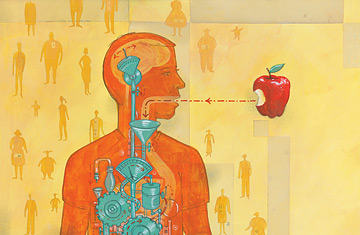
(2 of 5)
PRIMORDIAL GLUTTONY
If you're among the 200 million Americans who have ballooned past their target weight, you can take some consolation from the fact that your early ancestors would be very proud of you. Human beings emerged into a world in which food often was scarce, often spoiled and—when we learned the art of hunting—sometimes bit back, making the idea of eating a lot when you could both sensible and necessary. If you never knew when you were going to have dinner again, it was best to gorge when the food was there.
"We were hardwired to eat and eat—and particularly eat fatty foods because we didn't get them often," says Sharman Apt Russell, author of Hunger: An Unnatural History. We're programmed not only to overeat but also to fail to recognize immediately just when we've reached that point. Mothers tell kids not to wolf their food because it's harder to enjoy it that way and also because even after you've had enough, it can take a while for your brain to get the message. By the time it does, you're not just full; you're stuffed. "The people who didn't immediately lose their appetites, who could gorge themselves and keep going, those people would survive longer during the next famine," says Dr. Jeffrey Flier, obesity scientist and professor at Harvard Medical School.
That's not to say that your body doesn't work hard to keep itself balanced. Over the course of a year, the average adult male consumes about 900,000 calories, yet his weight may not rise or fall by more than a pound. Since a pound equals about 4,000 calories, that means his annual intake is just 0.4%—or 11 calories a day—above or below precisely what he needs to keep going. "You are within a potato chip a day of matching your intake with expenditure," says Randy Seeley, professor of psychiatry and associate director of the Obesity Research Center at the University of Cincinnati.
It takes a lot to maintain such a precisely balanced cycle of fueling and burning, and in most cases, it all starts with the clock. Like other animals, we are creatures of dietary habit. Feed us at 8 a.m., 1 p.m. and 7 p.m., and we learn to get hungry as those hours approach. Throw in a snack at 3:30 or before bedtime, and we get the itch then too. At all these moments, what's fueling the feeling is a substance called ghrelin.